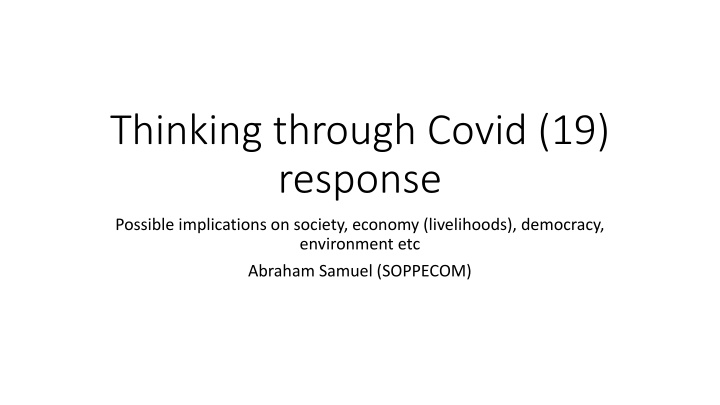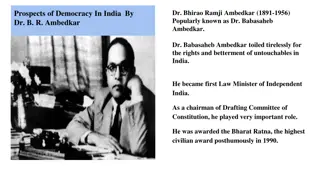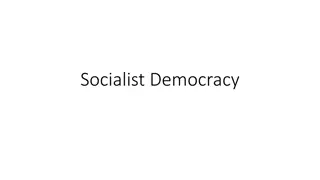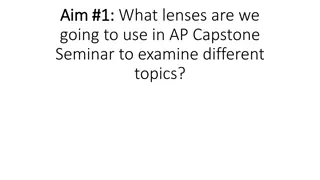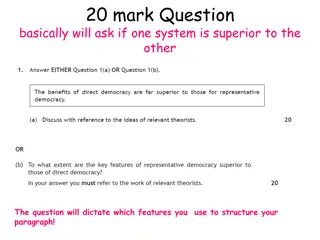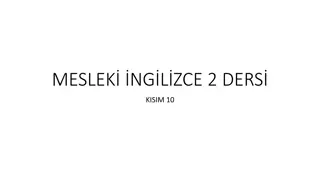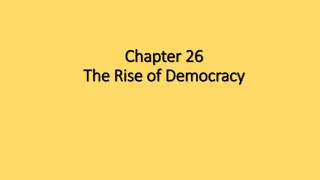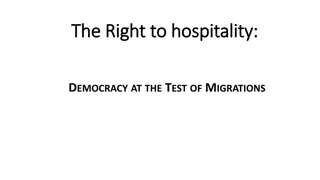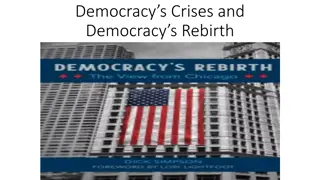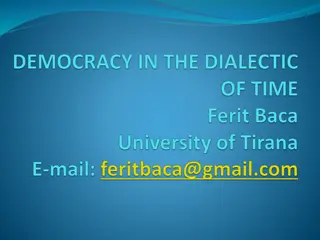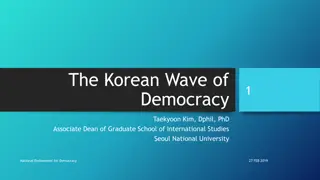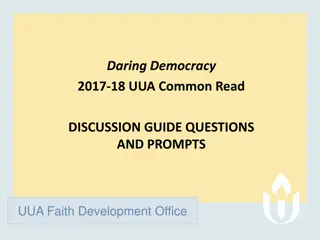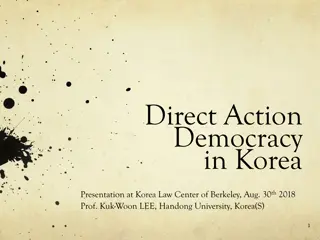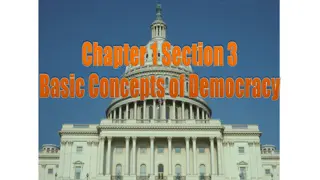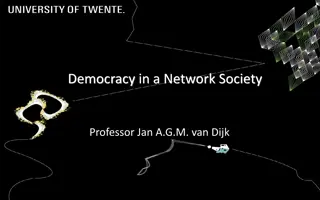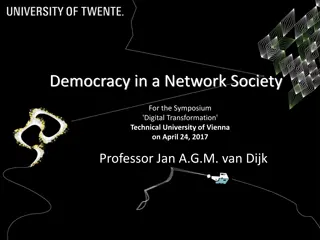Implications of Covid-19 Response on Society, Economy, Democracy, and Environment
Covid-19 response has far-reaching implications on various aspects of society including economy, democracy, and environment. The government's legal provisions and major issues in response are discussed, highlighting challenges and strategies for containment in different countries. Surveillance, isolation, and lockdown have emerged as dominant models, impacting public health systems and societal norms.
Download Presentation

Please find below an Image/Link to download the presentation.
The content on the website is provided AS IS for your information and personal use only. It may not be sold, licensed, or shared on other websites without obtaining consent from the author.If you encounter any issues during the download, it is possible that the publisher has removed the file from their server.
You are allowed to download the files provided on this website for personal or commercial use, subject to the condition that they are used lawfully. All files are the property of their respective owners.
The content on the website is provided AS IS for your information and personal use only. It may not be sold, licensed, or shared on other websites without obtaining consent from the author.
E N D
Presentation Transcript
Thinking through Covid (19) response Possible implications on society, economy (livelihoods), democracy, environment etc Abraham Samuel (SOPPECOM)
Covid dash board Global count (as of 15thMay evening) : 4,500,476; Depth count : 304,835 (6.77% of cases) India (as of 15thMay evening) : 81970 ; Death: 2700 (3.25% of cases) Predominantly urban areas Congested habitats Poor segments of society Elderly and people with co morbidities Migrants and minorities in many countries (UN call of Covid 19 as a human right crisis)
The government response: legal provision? The Epidemic Diseases Act, 1897 mainly section 2 of the act . Amendment on 22ndApril to punish those who attack the health workers The nationwide lockdown was imposed in exercise of the powers given to the union government under the Disaster Management Act, 2005 (DMA). The response imposed from above left with no choice for citizens or states Citizens merely as subjects and states left to fend for itself
The government response: major issues The response to the crisis made a public health issue more into a law and order and the responsibility of the repressive apparatus of the state (corona warriors, war with corona, salute the police etc) Nothing illustrates this absurdity better than the fact that major notifications and guidelines relating to Covid-19 are being issued by the Union Ministry of Home Affairs and not the Ministry of Health and Family Welfare Adopted Chinese model of containment in the face of lack of medical and epidemiological information on the disease, and public health facilities
The response for containment Surveillance , isolation (quarantine) and lockdown emerged as a dominant model following Chinese model of Success not only in India but in many other democratic countries Exceptions are Sweden, Netherlands, Greece and some Scandinavian nations where the state and citizens relation seen as based on trust and as of mutual contract There are some in-betweens like south Korea, Singapore, Taiwan etc The strategy is to reduce the burden on public health systems, buy-in time, problems related to lack of epidemiological understanding or ignorance of the virus behaviour etc- to flatten the curve a million dollar question!
Critique of the containment strategy Many critiques term these mechanisms as an authoritarian biopolitical strategy borrowing Foucault s famous concept of biopolitics and biopower ( Jaan hai to Jahan hai) State of exceptions to impose restrictions on the freedom and mobility, solidarity building etc (Giorgio Agamben) Following Foucault Prof Phillipe Sarasin analyse the current situation through the Leprosy model Plague model and Small Pox Model and conclude that the authoritarian plague model is employed for containment in most cases even though other forms are also in Practice The plague model envisages confinement and disciplining
Critique of the containment strategy Moving towards a surveillance state and society especially in relation to the technologies of disease surveillance: interesting to look into the interviews with some of the scholars especially historian Yuval Noah Harari (BBC, Al Jazeera) While technologies can be used for better outcome according to Harari the problem emerges when a purely medical surveillance transgress to other areas of concern. He also highlights the issue of surveillance of the inside a new form of technology of control Opening window : democratic biopolitics or biopolitics from below
Critique of the containment strategy A whole lot of critiques on issues of stay at home , physical distancing etc even though acknowledge that it is important from the perspective of the epidemic control Noticeable among this is the feminist critique of stay home : reinventing the patriarchal home as an institution for crisis management: Life will become hearthed or homeized ( new vocabularies!) and the class bias around the concept of home It also brought out the inherent contradiction of the neo liberal strategy: individualism (isolation, distancing etc) but demand for more and more government intervention
Failure of the response in our context Inadequate preparation and top down strategy creating a huge crisis especially amongst the urban poor No safety nets and a bunch of platitudes and banalities while addressing a major crisis States were left to fend themselves and no ownership of flip flops both in policy and practice A huge humanitarian crisis going to unfold in the future: when will the labour be back, on what security and at what cost
How will the issues evolve Is the strategy of containment going to spill over to other areas or in other words are we going to see more and more regularization of exception Is the new normal going to get routinised and become the normal: the survivalist panic , individualised fear, isolation and mistrust, confinement and immobility, absence of solidarity, resistance and political protests and a host of other things The alteration of every day life and meaning : for example keeping a distance traditionally considered as anti social is the new social . If I go closer to the other I am anti social and against the common goal
How will the issues evolve How will be the trade off going to happen between economy, livelihoods and containment Work from home now being highlighted is luxury a very few can enjoy in India like the physical distancing What would be the unfolding of rights and state citizen relations: We are seeing the trampling of labour rights already in a state of exception In the name of growth we may also see more and more transgressions in ecology and environment policies and actions
What is the way out The need for solidarity and collective self-organization in contrast to individualized survivalist panics Challenging the top down approach (Mann ki baat and patriarchal sermons) and building democratic dialogues and decentralized governance ( Kerala experience and the Ministry of Health admission of lack of decentralized mechanisms): biopolitics from below Exploring economically and ecologically sustainable models (sounds like clich ), surprisingly a host of international agencies ranging from UNEP to WEF suddenly has realized this Reviving agricultural produce supply chain, creating security of life and work for unorganized labour, informal service sector, traditional artisans and artist etc. etc. The role of movements and organizations?
